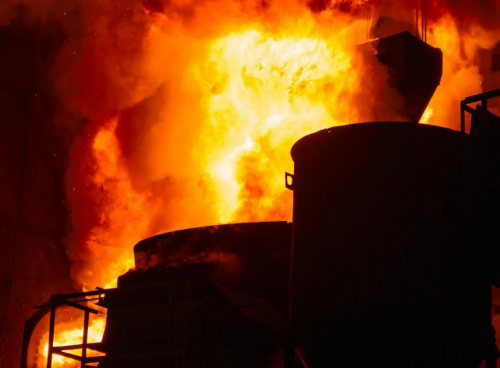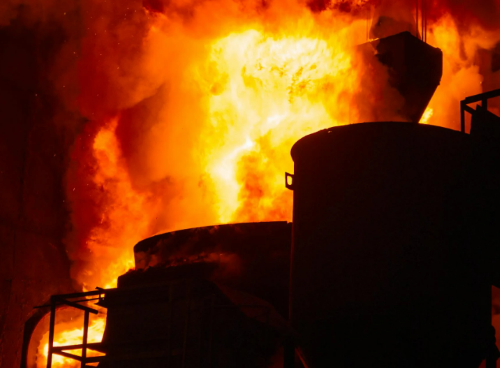The Most Heat-Resistant Metals and Their Applications

Introduction
Heat resistance is a critical property for materials used in high-temperature environments. Whether it's in aerospace, power generation, or industrial manufacturing, certain metals stand out for their exceptional ability to withstand extreme heat without losing their structural integrity or performance.
Let’s explore the most heat-resistant metals and their applications.

1. Tungsten (W)
Tungsten is the metal with the highest melting point of any known element, around 3,422°C (6,192°F). This makes it ideal for use in extreme heat conditions. Tungsten maintains its strength and durability even at temperatures approaching its melting point.
It finds applications in:
- Aerospace and Defense: Tungsten is used in rocket nozzles, spacecraft components, and aerospace engines due to its high melting point and excellent resistance to thermal stress.
- Light Bulb Filaments: Tungsten filaments are used in incandescent light bulbs and other high-temperature lighting due to their ability to withstand intense heat.
- Electronics: Tungsten is used in high-performance electronics, including components like semiconductor leads and contacts that operate in high-heat environments.
- Nuclear Reactors: Tungsten is also used in the construction of nuclear reactors, particularly in fuel rods and other components exposed to high radiation and heat.
Further reading: Metal with High Melting Point | Top 10 Metals with High Melting Points
2. Rhenium (Re)
Rhenium has a melting point of around 3,180°C (5,756°F), which places it among the top metals in terms of heat resistance. It also has excellent creep resistance and maintains strength at elevated temperatures.
Its applications include:
- Jet Engine Components: Rhenium is often used in turbine blades, exhaust nozzles, and other critical parts of jet engines due to its high-temperature stability and resistance to thermal fatigue.
- Aerospace and Defense: Similar to tungsten, rhenium is used in aerospace applications where high heat resistance is required.
- Catalysts: Rhenium is used as a catalyst in petroleum refining, especially in processes like hydrocracking, where heat and chemical reactions are involved.
- Electrical Contacts and Filaments: Due to its resistance to high temperatures and corrosion, rhenium is used in high-performance electrical contacts and filaments.
3. Molybdenum (Mo)
Molybdenum has a melting point of approximately 2,623°C (4,753°F). It is known for its high strength at elevated temperatures, as well as its resistance to thermal expansion.
Its applications are:
- Steel Alloys: Molybdenum is often alloyed with steel to enhance its strength and heat resistance. Molybdenum steels are used in industrial applications, including power plants, refineries, and manufacturing equipment.
- Aerospace: Molybdenum is used in the aerospace industry to fabricate high-temperature components like rocket nozzles and heat shields.
- Electronics: It is also employed in electronics for high-temperature applications such as cathodes, filaments, and electrodes.
- Glass Manufacturing: Molybdenum is used in the production of glass, where it is employed in the form of electrodes and other components that must withstand extremely high temperatures.
4. Tantalum (Ta)
Tantalum has a melting point of around 3,017°C (5,463°F). It is highly resistant to heat, as well as to corrosion and oxidation at elevated temperatures.
Ta finds applications in:
- Aerospace and Defense: Tantalum is used in aerospace applications, particularly in jet engine components, where its high melting point and resistance to corrosion in extreme heat are essential.
- Chemical Industry: Tantalum is used in the manufacture of heat exchangers, reactors, and pipes in chemical plants due to its resistance to corrosive environments and high temperatures.
- Electronics: It is used in the production of capacitors and resistors in electronic devices that operate at high temperatures.
- Medical Devices: Tantalum is biocompatible and is used in medical implants and prosthetics, particularly in high-temperature sterilization processes.
5. Niobium (Nb)
Niobium has a melting point of 2,477°C (4,491°F). While not as high as some other metals, niobium still offers excellent heat resistance and is known for its ability to withstand both high temperatures and oxidation.
Nb is useful in:
- Aerospace and Rocketry: Niobium is used in aerospace for heat shields, rocket engines, and fuel tanks due to its high melting point and resistance to thermal shock.
- Steel Alloys: It is alloyed with steel to create high-strength materials for use in applications such as construction, transportation, and high-temperature environments.
- Superconductors: Niobium is critical in the production of superconducting materials used in medical devices such as MRI machines and in high-energy physics.
6. Titanium (Ti)
Titanium has a melting point of around 1,668°C (3,034°F), and while it is not as heat-resistant as tungsten or rhenium, it is still highly resistant to thermal stress and maintains strength at elevated temperatures.
Ti is useful in:
- Aerospace: Titanium is extensively used in aircraft and spacecraft for parts like engine components, turbine blades, and airframes due to its high strength-to-weight ratio and resistance to heat.
- Chemical Industry: Titanium’s resistance to corrosion and heat makes it ideal for heat exchangers, reactors, and piping in the chemical and petrochemical industries.
- Medical Devices: Titanium is also used in medical implants and prosthetics because of its strength, biocompatibility, and resistance to heat.
7. Zirconium (Zr)
Zirconium has a melting point of around 1,855°C (3,371°F), and while it is not as high as some of the other metals listed here, it is still highly resistant to heat and corrosion.
The applications of zirconium include:
- Nuclear Reactors: Zirconium is widely used in the nuclear industry, particularly in fuel rods, due to its ability to withstand high temperatures without reacting with nuclear fuels.
- Aerospace and Defense: Zirconium is used in aerospace applications that require both heat resistance and high strength, particularly in the form of alloys.
- Chemical Industry: Zirconium’s resistance to corrosion at high temperatures makes it useful in chemical processing equipment such as pumps, valves, and reactors.
Summary Table
|
Metal |
Melting Point (°C) |
Applications |
|
Tungsten (W) |
3,422 |
Aerospace, light bulb filaments, electronics, nuclear reactors. |
|
Rhenium (Re) |
3,180 |
Jet engines, aerospace, catalysts, electrical contacts. |
|
Molybdenum (Mo) |
2,623 |
Steel alloys, aerospace, electronics, glass manufacturing. |
|
3,017 |
Aerospace, chemical industry, electronics, medical devices. |
|
|
Niobium (Nb) |
2,477 |
Aerospace, steel alloys, superconductors. |
|
1,668 |
Aerospace, chemical industry, medical devices. |
|
|
1,855 |
Nuclear reactors, aerospace, chemical industry. |
Conclusion
The heat-resistant metals listed above are indispensable in industries where extreme temperatures are a regular occurrence. From aerospace and defense to chemical processing, these metals are engineered to maintain their strength, performance, and reliability even in the most challenging environments. Understanding the heat resistance of these metals helps industries choose the right materials for their most demanding applications, ensuring both safety and efficiency in their operations. For more information, please check Advanced Refractory Metals (ARM).
{{item.content}}
LEVE A REPLY
{{item.children[0].content}}
{{item.content}}






